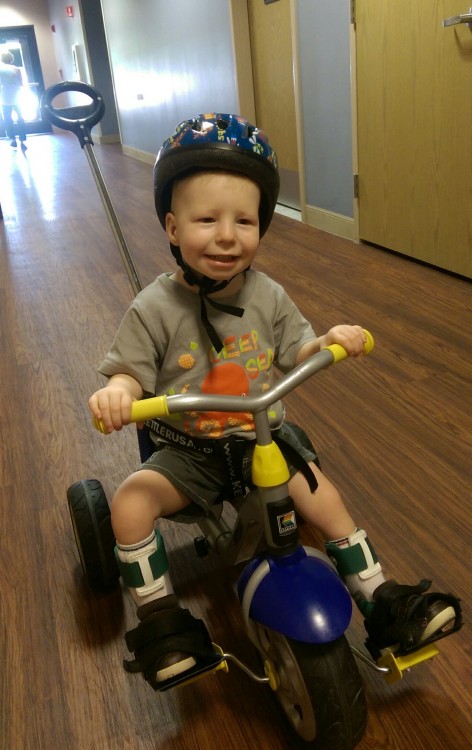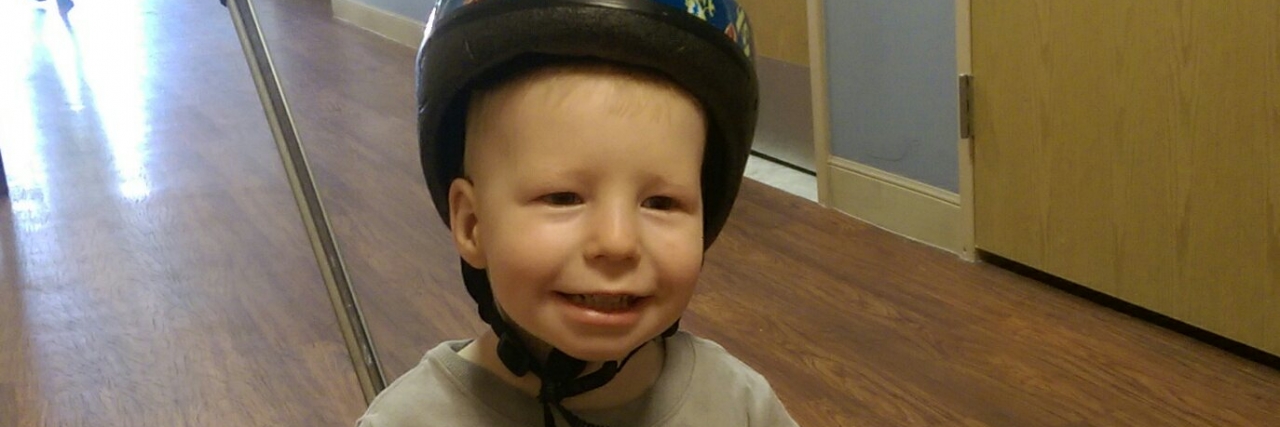 If you’re the parent of a child with special needs, I’m almost 100 percent certain you heard the same thing I did upon diagnosis. I’m willing to bet my right arm that a doctor, nurse or social worker urged you to “avoid comparisons between your child and ‘typical’ kids.”
If you’re the parent of a child with special needs, I’m almost 100 percent certain you heard the same thing I did upon diagnosis. I’m willing to bet my right arm that a doctor, nurse or social worker urged you to “avoid comparisons between your child and ‘typical’ kids.”
“He’ll reach his own milestones,” everyone said. “Don’t compare little Kyler to little Johnny because Kyler has a different set of challenges.” Sounds like solid enough advice.
But what happens when little Kyler and little Johnny have the same disorder, and little Kyler is still developmentally way behind little Johnny? This is my experience.
Kyler, my amazing little superhero, falls on the “more affected” end of the developmental spectrum for his age and disorder. Maybe your child does too. Maybe you’re also frustrated that we tend to almost exclusively hear, “beating the odds” type stories and few that reflect experiences like ours. Here are some of my personal challenges and survival strategies for this less-publicized (but not uncommon) situation.
I knew what our Prader-Willi syndrome (PWS) diagnosis meant — or at least I thought I did. I was told Kyler would be delayed but with the advent of new medications, diets and supplement regimes, none of that would matter! Well, let me tell you: Kyler is on just about every remedy, shot and snake oil known to the PWS world, and he’s still not developing on par with his PWS peers. While some 2-year-olds with PWS are walking, talking, running and chomping chunks of steak with ease, Kyler is nonverbal, cannot ambulate on his own and is still eating small pieces of soft foods.
PWS and Kyler’s “more affected” status affects my life in ways I never would have been able to predict. Take social media, for instance. Platforms like Facebook have allowed me to not only connect with fellow PWS parents but also help me to stay up-to-date with the latest and greatest treatments. Unfortunately, Facebook can also be a breeding ground for insecurity. Like many people from my generation, I occasionally spend time jealously flipping through friends’ pictures of milestones, parties and exotic vacations. However, I also find myself compulsively analyzing pictures of toddlers with PWS who are singing the alphabet and climbing up and down stairs. I can’t help but wonder, “What the heck am I doing wrong?”
I try so hard to swallow my bitterness, and I’m genuinely happy for those kids who are doing awesome, but… man. I want my kid to beat the odds, too! We haven’t even encountered the later (and worse) stages of Prader-Willi syndrome, and I’m absolutely terrified those will hit Kyler just as hard. As new medications are developed, I hear things like, “Swallow your negativity, Megan! A cure is on the horizon!” The real truth, however, is that no pill, syrup or shot is going to replace Kyler’s missing piece of chromosome 15 (105 genes, to be exact). Besides, what happens if those medications don’t work for us just like everything else we’ve tried?
I think what much of my experience as a “more affected” parent reflects is the desire for a modicum of control. Our lives have a tendency to become crazy at a moment’s notice, and having something, anything as a constant is required to keep us from completely snapping and running around naked in public. I can attend college, maintain a 4.0 and act as full-time mom, caregiver and advocate. What I cannot control is how Prader-Willi syndrome affects Kyler or how various treatments affect (or don’t affect) his PWS. That’s so difficult.
I’ve been told by many in the special needs community, and even in my own family, that I have an overly negative or pessimistic outlook. It’s not that I don’t have hope for Kyler’s future — I’m excited by every milestone my little guy approaches with his characteristic methodical pace. However, I find that directly addressing Kyler’s current and potential limitations helps me make the best decisions for my family. Also, I’ve found that approaching PWS with a healthy dose of realism and skepticism has helped to minimize the stress and anxiety common to many special needs families.
It’s taken me a long time to come to terms with this, but Kyler’s disorder is Kyler’s disorder, and no one else’s. He may never recite Shakespeare’s sonnets or walk with ease (or who knows, maybe he will!). Our lives will always have a certain level of stress resulting from his disorder, but Kyler is smart, strong and amazing. He’s not just a little boy with Prader-Willi syndrome. Kyler is a superhero. And after all, is it really fair to compare a superhero to a mere “typical” human?

